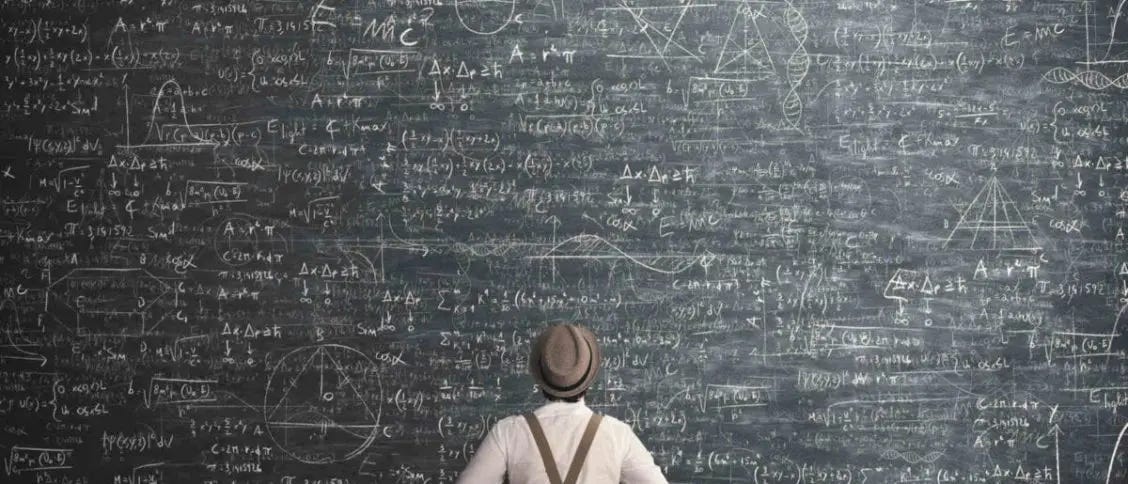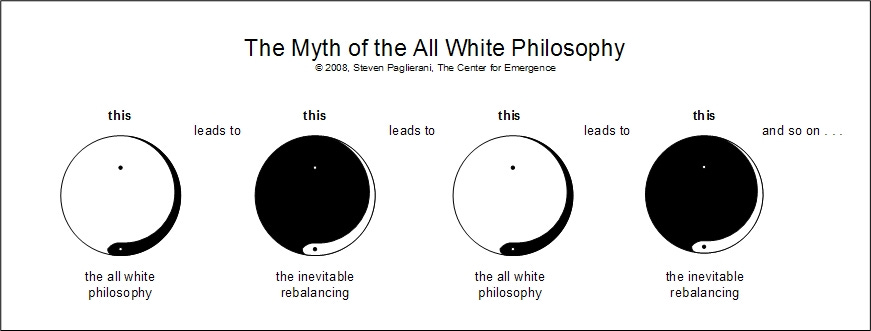Chaos & Order
I’ve recently been getting into the works of Professor Jordan Peterson.
It’s not that I wasn’t familiar with him as a person or a thinker, but everything I’d heard from him was in the form of podcasts or YouTube video lectures.
And being that I’ve got tickets to see the man later this month, I considered it prudent on my part to backload the experience with his actual formal writings.
I started with his first major work, Maps of Meaning. This one is dense. Very VERY academically minded, worded and formatted. But it was worth the slog when I then got into his most popular release, 12 Rules For Life.
If the former was overly heady, the latter brought it all down to earth for the lay reader. But, having started with the dense literature first, the more accessible writing wound up holding a deeper meaning.
One of the overarching concepts that Peterson uses to categorize everything in human experience is that of Chaos & Order. Another form of this dichotomy (used more in Maps of Meaning) is the Known and the Unknown.
Consider that everything in everyone’s personal perception of the world falls into one of these two categories: Chaos (the Unknown) or Order (the Known).
As a matter of fact, everything in existence from the moment we’re born begins in the category of the Unknown — functionally, Chaos! Chaos doesn’t necessarily mean that something is dangerous or should be feared, but it represents the unknown status of a thing upon the total spectrum of totally safe and totally deadly.
That’s a LOT of room for error if you don’t know where along that massive spectrum a thing sits!
It’s for this reason that we are naturally anxious of the Unknown. Why Chaos is bed fellows with anxiety. It’s not that we know that something is deadly (that would be preferable, as it would move it into the category of the Known), it’s the uneasy fact that we DON’T know that it ISN’T that creates a natural aversion to it.
This is mirrored by one of the most ancient and predominant portions of the brain — the amygdala. This portion of our brains (also called the “Lizard Brain”) is where the fear response is activated from. Fight or flight stems from this center.
This function is the root of, or the actuary of, our self preservation instinct. In the face of Chaos, our lizard brain takes the wheel and demands our attention. This is the very reason why the news, since the 80s, has keyed in on salacious headlines. “If it bleeds, it leads” didn’t become the norm for no reason. We naturally give preeminence to the Unknown over the Known for the fear of where it may rest upon that mysterious spectrum of Chaos.
Logic & Systems
Moving from the ancient functions of the amygdala to the more modern reasoning centers of the brain like the cerebral cortex, humanity has sought to overcome the Unknown by hyper-focusing on it’s antitheses.
The more we can know, the less Unknown there is!
In this way, we’ve striven to whittle the Chaos away from our reality in a fevered hope of conquering our amygdalic fear.
Technology has been the shinning light to come from this endeavor. We’ve learned and built remarkable things, miracles really, from the application of what we’ve moved from the Unknown to the Known.
There’s a reason why science has eclipsed theology and even philosophy in the thought spheres of the academic for the past 200-300 years. We’ve discovered properties of our reality and situated them into ordered systems that reliably produce quantifiable magic for the masses.
These systems, and science itself, are welded together by the power and dominance of logic. Logic used to be the implement of philosophy, but added to the world of systemic science, has given us the computer, the rocket ship and the nuclear reactor.
But, what are the systems we use? And I mean that directly. Not “tell me about all the systems we use”. What are they actually?
Going back to the stoic philosophers, there was a belief in the transcendental truths of existence. That is to say, that the universe has root — a priori — truths that simply needed to be found. Like a scavenger hunt or an archeological dig. Once you find these truths, then all systems will logically branch out from them.
This makes sense. But, it’s founded on certain assumptions. And it’s in these assumption that the entire paradigm of logic and systems may lose their privileged importance — or transcendental status.
Consider this; how much about total reality do you think we (being humanity) know? Use a percentage. Do you think we know, maybe, 50%? Not likely. A suitably humble response may not even give us 1% of total reality. Well now, from that perspective, where do you think all of our systems are built from? From within that (maybe) 1% of total reality.
The chance that what we see as a fundamental system is in fact fundamental is extremely low. Realistically, what our systems represent are more like a floating structure — a bubble of logic — within a massive ocean of the Unknown… of Chaos!
Because the fact is, ALL systems that we know are man made. All of them. Even the ones that we think are rudimentary, or a priori. Even “natural” systems like ecosystems and physical dictums are in fact just our attempts to systematize what we see based upon what we know.
To even be able to assert that systems are possible (that is, that they represent transcendental truths) is to presume that we know everything. Because, for the lack of anything in the ordered side of Chaos and Order, we must realistically admit that critical knowledge HAS to exist in the ocean of Chaos that we haven’t explored, and perhaps CAN’T.
Vital Balance
So why is it that our systems work at all? It’s clearly the case that they do. Certainly to the degree that they matter to day-to-day life.
This, most definitely, isn’t the argument that I’m meaning to make.
I am constantly (and presently) the beneficiary of many of the most useful and ubiquitous systems of affect in the modern world. The fact of their utility, or empirical quality isn’t why I bring this up at all.
There exists a persistent and pernicious conflation or delusion in the sciences and the haughtiest strata of academia. One that leads it’s most fervent disciples to the conclusion that they are the arbiters of truth based upon their structures of fully reducible logic.
That the systems they employ simply are what is and that the path they tread towards total knowledge — that is, the eradication of Chaos — is one of eventual and inevitable conclusion.
But, because of the reality of our miniscule understanding of reality, Chaos is not only never going to be eradicated, but simple (in humanity’s case) cannot be.
But that isn’t a consideration of the scientific minded. In fact, so many systems and constructs — even the ones that we gain great benefit from — have effectively used logic to shore up and insulate out the possibility of Chaos within them.
Chaos is largely considered a rounding error in the logical equations that build our systems. Once it’s out of the system, then that system is considered complete.
But this idea is only one you’ll find within the pillar of science. The older pillars that man relied upon, those of Philosophy and Theology, not only knew that Chaos could not be rounded out, but considered it vital to any wholistic framework of perception.
This is made most visually salient through the Taoist’s Yin and Yang. A circle that consists of symmetrical opposites in an eternal spiral opposing each other.
More over, there exists a small amount of the other within each.
The concept of the Tao (considered the way or the path) is fundamentally situated upon, not the eradication of Chaos, but the vital balance of it with Order.
The Tao is the line that exists at the meeting of the Yin and the Yang. The thin path that spans and permits the tension between the Known and the Unknown.
The danger of systems that present their constructs as wholly logical is not that there is no danger; it’s that the natural existence of Chaos is ignored as if it’s been defeated.
It hasn’t.
And in Peterson’s contention, we set our selves up for an unexpected emergence of Chaos the more we delude ourselves into believing it doesn’t exist. In fact, the root word of emergency is emergence. An emergency stems from the unexpected, headlong collision with something we didn’t expect.
That’s Chaos.
The Seduction of Logic
With all of this in mind, what can we learn?
Should we stop believing in science? Should we question everything that purports to be an answer to anything?
My entreatment to the reader would simply be this:
Be warry of anything that is overly saturated by logic/Order.
Be, also, warry of anything overly saturated by illogic/Chaos.
Total Order is tyranny. Total Chaos is anarchy.
The balance of the two is the harmony we require to exist in a universe of inevitable and perpetual tension between them.
Seek balance, not Order.
~ Drew Weatherhead
Listen to the full podcast episode here:
The Social Disorder Podcast: A Case for the Illogical
Get a copy of my New Book, Consciousness Reality & Purpose now! Available in Audio, Digital, Paperback or Hardcover! (click the image below)








I love Jordan Peterson. And I really like your conclusion -- The Seduction of Logic. Moderation and Balance in all things has always been a motto in my simple life. It works!
I've been saying for a while that the 2nd law of thermodynamics is in opposition to the WEF CCP totalitarian state. So in some ways because of that there is an ally in science that will work without the need to be red pilled and will likely succeed.